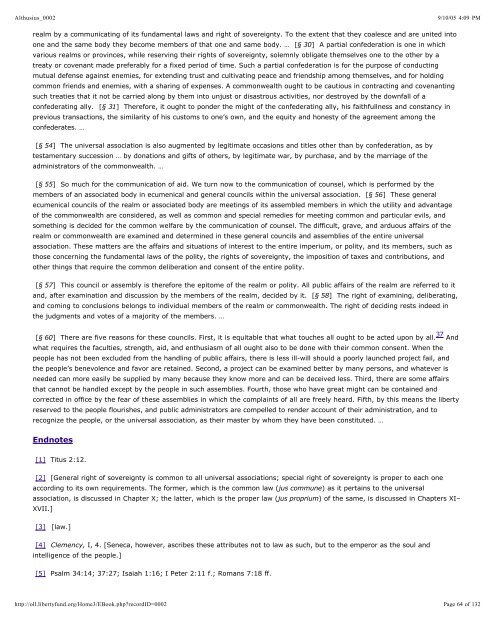Johannes Althusius: Politica - Hubertlerch.com - HubertLerch.com
Johannes Althusius: Politica - Hubertlerch.com - HubertLerch.com
Johannes Althusius: Politica - Hubertlerch.com - HubertLerch.com
You also want an ePaper? Increase the reach of your titles
YUMPU automatically turns print PDFs into web optimized ePapers that Google loves.
<strong>Althusius</strong>_0002<br />
9/10/05 4:09 PM<br />
realm by a <strong>com</strong>municating of its fundamental laws and right of sovereignty. To the extent that they coalesce and are united into<br />
one and the same body they be<strong>com</strong>e members of that one and same body. … [§ 30] A partial confederation is one in which<br />
various realms or provinces, while reserving their rights of sovereignty, solemnly obligate themselves one to the other by a<br />
treaty or covenant made preferably for a fixed period of time. Such a partial confederation is for the purpose of conducting<br />
mutual defense against enemies, for extending trust and cultivating peace and friendship among themselves, and for holding<br />
<strong>com</strong>mon friends and enemies, with a sharing of expenses. A <strong>com</strong>monwealth ought to be cautious in contracting and covenanting<br />
such treaties that it not be carried along by them into unjust or disastrous activities, nor destroyed by the downfall of a<br />
confederating ally. [§ 31] Therefore, it ought to ponder the might of the confederating ally, his faithfullness and constancy in<br />
previous transactions, the similarity of his customs to one’s own, and the equity and honesty of the agreement among the<br />
confederates. …<br />
[§ 54] The universal association is also augmented by legitimate occasions and titles other than by confederation, as by<br />
testamentary succession … by donations and gifts of others, by legitimate war, by purchase, and by the marriage of the<br />
administrators of the <strong>com</strong>monwealth. …<br />
[§ 55] So much for the <strong>com</strong>munication of aid. We turn now to the <strong>com</strong>munication of counsel, which is performed by the<br />
members of an associated body in ecumenical and general councils within the universal association. [§ 56] These general<br />
ecumenical councils of the realm or associated body are meetings of its assembled members in which the utility and advantage<br />
of the <strong>com</strong>monwealth are considered, as well as <strong>com</strong>mon and special remedies for meeting <strong>com</strong>mon and particular evils, and<br />
something is decided for the <strong>com</strong>mon welfare by the <strong>com</strong>munication of counsel. The difficult, grave, and arduous affairs of the<br />
realm or <strong>com</strong>monwealth are examined and determined in these general councils and assemblies of the entire universal<br />
association. These matters are the affairs and situations of interest to the entire imperium, or polity, and its members, such as<br />
those concerning the fundamental laws of the polity, the rights of sovereignty, the imposition of taxes and contributions, and<br />
other things that require the <strong>com</strong>mon deliberation and consent of the entire polity.<br />
[§ 57] This council or assembly is therefore the epitome of the realm or polity. All public affairs of the realm are referred to it<br />
and, after examination and discussion by the members of the realm, decided by it. [§ 58] The right of examining, deliberating,<br />
and <strong>com</strong>ing to conclusions belongs to individual members of the realm or <strong>com</strong>monwealth. The right of deciding rests indeed in<br />
the judgments and votes of a majority of the members. …<br />
[§ 60] There are five reasons for these councils. First, it is equitable that what touches all ought to be acted upon by all.<br />
37<br />
And<br />
what requires the faculties, strength, aid, and enthusiasm of all ought also to be done with their <strong>com</strong>mon consent. When the<br />
people has not been excluded from the handling of public affairs, there is less ill-will should a poorly launched project fail, and<br />
the people’s benevolence and favor are retained. Second, a project can be examined better by many persons, and whatever is<br />
needed can more easily be supplied by many because they know more and can be deceived less. Third, there are some affairs<br />
that cannot be handled except by the people in such assemblies. Fourth, those who have great might can be contained and<br />
corrected in office by the fear of these assemblies in which the <strong>com</strong>plaints of all are freely heard. Fifth, by this means the liberty<br />
reserved to the people flourishes, and public administrators are <strong>com</strong>pelled to render account of their administration, and to<br />
recognize the people, or the universal association, as their master by whom they have been constituted. …<br />
Endnotes<br />
[1]<br />
Titus 2:12.<br />
[2] [General right of sovereignty is <strong>com</strong>mon to all universal associations; special right of sovereignty is proper to each one<br />
according to its own requirements. The former, which is the <strong>com</strong>mon law ( jus <strong>com</strong>mune) as it pertains to the universal<br />
association, is discussed in Chapter X; the latter, which is the proper law ( jus proprium) of the same, is discussed in Chapters XI–<br />
XVII.]<br />
[3]<br />
[law.]<br />
[4] Clemency, I, 4. [Seneca, however, ascribes these attributes not to law as such, but to the emperor as the soul and<br />
intelligence of the people.]<br />
[5]<br />
Psalm 34:14; 37:27; Isaiah 1:16; I Peter 2:11 f.; Romans 7:18 ff.<br />
http://oll.libertyfund.org/Home3/EBook.php?recordID=0002<br />
Page 64 of 132







